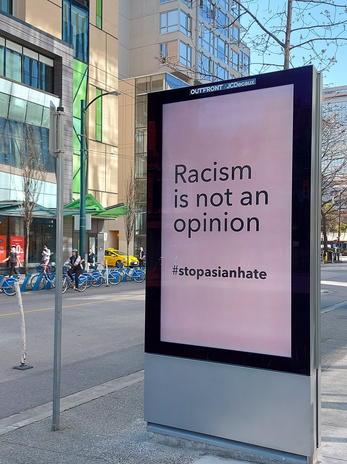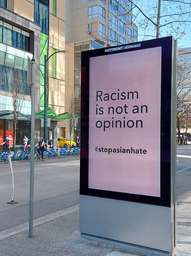Printed in big black bold letters against a pink background read’s:
“Racism is not an opinion #stopasianhate”
Walking around downtown, I’ve seen this sign on billboards.
In contrast, occasionally I’ve seen the opposite; Graffiti art promoting racial slurs and Asian hate. As a second-generation Filipino Asian-Canadian I found this not only heartbreaking, but hard to comprehend.
Since 2020, awareness of AAPI – Asian American Pacific Islander Initiative has been highlighted and been focal on the news, due to recent spikes of hate crimes towards Asians. The Organization Stop AAPI Hate documents and addresses discrimination amid the COVID-19 pandemic.
From March to December 2020, Stop APPI hate has received an overflow of 2808 incidents of hate crimes – racism, discrimination, and violence targeting the Asian-American community. And it has only induced more fear.
Why has there been so much hate towards Asians during the COVID-19 pandemic?
First, we need to understand what is Xenophobia and its relation to racism. Wikipedia defines Xenophobia, or fear of strangers as a term that is applied to a fear of someone who is different from us. Hostility towards outsiders is often a reaction to fear.
In my attempt to understand xenophobia and racism even further, I did some digging and found some interesting historical facts. Throughout history, moments of pandemics seem to be a center point for existing social inequalities.
Sadly, during times of pandemics it can bring out the worst in humanity. Emotions can easily run wild, and people find scapegoats. It’s easy to blame especially with the current state of world health affairs. As Rodrick McGrew reported in his study on Cholera, “epidemics do not create abnormal situations, but rather sharpen existing behavior which betray deeply rooted and continuing social imbalances”.
There is a danger in generalization; that is saying that because the COVID-19 originated in China, it’s the fault of every Chinese – or Asians as a whole. We have already seen the severe consequences of this kind of thinking across news and social media platforms.
With current easy access to information on social media, many of these hate crimes have been caught on camera. Yet, there are many unseen acts of violence and more notably, the decline of mental health off screen that has affected so many. Stigma and prejudice are one of the leading causes of anxiety and depression during COVID-19 Pandemic.
Here is a link to CDC that provides information on dealing with stigma.
It truly is a difficult time, not only because we have to worry about an invisible virus, but we have to deal with this continuous prejudice and violence towards race. The legacy of discrimination tied to outbreaks of disease, should lead us to re-examine how we respond when pandemics occur.
Sooner or later, the Covid-19 virus may fade, but there is another virus surfacing that divides and polarizes us.
In order for us to stay safe, we need an emphasis on accurate information. One source that I have found helpful in understanding the chaos of today’s pandemic and the issues arising, is from the Atlantic: Social Distance podcast.
One way we can stop stigma is by staying informed – just like washing your hands we need to keep on washing our thoughts with accurate information, to help ease the fear and anxiety brought upon COVID-19 pandemic.
Viruses are blind to race.
Disease does not discriminate the way people do.
There is no vaccine for hate, discrimination and prejudice.
Except perhaps, more understanding and empathy.



